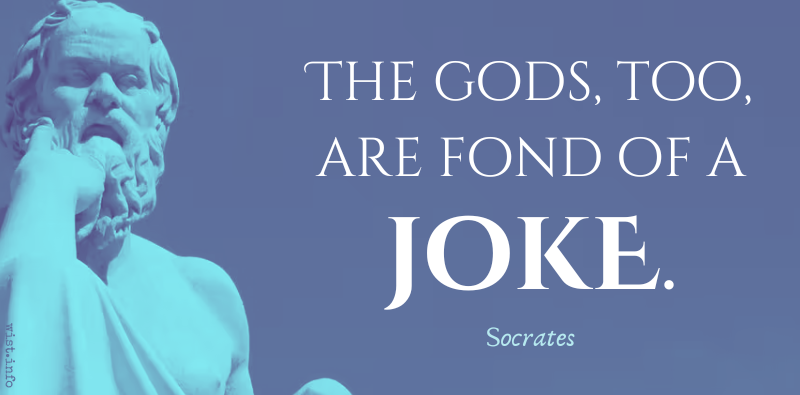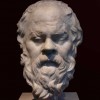What have you to say against laughing? Cannot one be very serious even whilst laughing? Dear Major, laughter keeps us more rational than vexation.
[Was haben Sie denn gegen das Lachen? Kann man denn auch nicht lachend sehr ernsthast sein? Lieber Major, das Lachen erhält uns vernünftiger als der Verdruss.]
Gotthold Lessing (1729-1781) German playwright, philosopher, dramaturg, writer
Minna von Barnhelm, Act 4, sc. 6 [Minna] (1763) [tr. Holroyd/Bell (1888)]
(Source)
(Source (German)). Alternate translation:
What have you to say against laughing? Can we not while laughing be very serious? Laughing keeps us more rational than sadness caused by vexation.
[Source (1884)]
Quotations about:
sense of humor
Note not all quotations have been tagged, so Search may find additional quotes on this topic.
Maturity is a bitter disappointment for which no remedy exists, unless laughter can be said to remedy anything.
Kurt Vonnegut, Jr. (1922-2007) American novelist, journalist
Cat’s Cradle, ch. 88 [Bokonon] (1963)
(Source)
In the theater, as in life, we prefer a villain with a sense of humor to a hero without one.
Mignon McLaughlin (1913-1983) American journalist and author
The Neurotic’s Notebook, ch. 7 (1963)
(Source)
Among other things I think humor is a shield, a weapon, a survival kit. Not only has this brief span of ours been threatened by such perils not of our making such as fire and flood, Tyrannosaurus Rex, the black death, and hurricanes named after chorus girls, but we have been most ingenious in devising means for destroying each other, a habit we haven’t yet learned how to kick.
So here we are several billion of us, crowded into our global concentration camp for the duration. How are we to survive? Solemnity is not the answer, any more than witless and irresponsible frivolity is. I think our best chance lies in humor, which in this case means a wry acceptance of our predicament. We don’t have to like it but we can at least recognize its ridiculous aspects, one of which is ourselves.
Ogden Nash (1902-1971) American poet
Commencement address at his daughter Linell’s boarding school
(Source)
Quoted in Douglas M. Parker, Dana Giaoia, Ogden Nash: The Life and Work of America's Laureate of Light (2005).
I have found throughout my life that, if all else fails, the character of a man can be recognized by nothing so surely as by a jest which he takes badly.
If you can’t joke about the most horrendous things in the world, what’s the point of jokes? What’s the point in having humor? Humor is to get us over terrible things. That’s all it’s for. That’s why you should laugh at funerals. Of course it’s the wrong thing to say. That’s why it’s funny.
Ricky Gervais (b. 1961) English comedian, actor, director, writer
Interview with Chris Heath, GQ (15 May 2013)
(Source)
There are two insults which no human being will endure: The assertion that he hasn’t a sense of humor, and the doubly impertinent assertion that he has never known trouble.
Sinclair Lewis (1885-1951) American novelist, playwright
Main Street, ch. 31, sec. 2 (1920)
(Source)
But finally, there is one other quality I would mention among these that I believe will fit you for difficult and important posts. This is a healthy and lively sense of humor.
We have had too many of these solemn people. Whenever I see an exceedingly solemn man, I know he is an exceedingly stupid man. No man of any humor ever founded a religion — never. Humor sees both sides. While reason is the holy light, humor carries the lantern, and the man with a keen sense of humor is preserved from the solemn stupidities of superstition.
Robert Green Ingersoll (1833-1899) American lawyer, agnostic, orator
“What Must We Do To Be Saved?” Sec. 11 (1880)
(Source)
Never in History has the average American citizen found more need for a saving sense of humor. Beset by threats of destruction by atomic bombs, inflation, mounting taxes, overcrowded cities, witch hunters, propagandists, caterwauling commentators, and the incessant clamor of radio and television commercials, he must laugh occasionally to keep from blowing his top altogether. It’s far too easy to see only the shadows, and ignore the patches of sunlight that remain.
Bennett Cerf (1898-1971) American publisher, humorist
Laughter Incorporated, Foreword (1950)
(Source)
A man without mirth is like a waggon without springs, in which one is caused disagreeably to jolt by every pebble over which it runs. A man with mirth is like a chariot with springs, in which one can ride over the roughest road, and scarcely feel anything but a pleasant rocking motion.
Henry Ward Beecher (1813-1887) American clergyman and orator
Royal Truths (1862)
(Source)
Frequently rendered, but unsourced in this form:
A person without a sense of humor is like a wagon without springs. It's jolted by every pebble on the road.
In Proverbs from Plymouth Pulpit, "The Human Mind" [ed. Drysdale (1887)], Beecher is recorded similarly saying:
A practical, matter-of-fact man is like a wagon without springs: every single pebble on the road jolts him; but a man with imagination has springs that break the jar and jolt.
Although my mother didn’t know anything about science, she had a great influence on me as well. In particular, she had a wonderful sense of humor, and I learned from her that the highest forms of understanding we can achieve are laughter and human compassion.
Richard Feynman (1918-1988) American physicist
What Do You Care What Other People Think?, “The Making of a Scientist” (1988)
(Source)
Nonsense wakes up the brain cells. And it helps develop a sense of humor, which is awfully important in this day and age. Humor has a tremendous place in this sordid world. It’s more than just a matter of laughing. If you can see things out of whack, then you can see how things can be in whack.
Dr. Seuss (1904-1991) American author, illustrator [pseud. of Theodor Geisel]
“Author Isn’t Just a Cat in the Hat,” interview by Miles Corwin, Los Angeles Times (1983-11-27)
(Source)
For the name of these gods there is both a serious and a humorous explanation; the serious explanation is not to be had from me, but there is no hindrance to my offering the humorous one, for the gods too are fond of a joke.
[ἀλλὰ ἔστι γὰρ καὶ σπουδαίως εἰρημένος ὁ τρόπος τῶν ὀνομάτων τούτοις τοῖς θεοῖς καὶ παιδικῶς. τὸν μὲν οὖν σπουδαῖον ἄλλους τινὰς ἐρώτα, τὸν δὲ παιδικὸν οὐδὲν κωλύει διελθεῖν: φιλοπαίσμονες γὰρ καὶ οἱ θεοί.]
Socrates (c.470-399 BC) Greek philosopher
In Plato, Cratylus [Κρατύλος], ch. 23 / 406c [tr. Hyers (1969)]
(Source)
The final phrase, "The gods, too, are fond of a joke," is broadly misattributed to Aristotle, without any citation. It is also sometimes misattributed to Edward Albee.
Cratylus is dialogue about the nature of names. Socrates, here, has been asked about the origins of the names of the gods, Dionysus and Aphrodite. Burges (below) notes that Plato had been "partly initiated into the mysteries of Demeter and Dionysus," part of which dealt seriously with the meanings of those deities' names; his avoiding the "serious explanation" is not betray his oath of secrecy to the cult.
(Source (Greek)). Alternate translations:
But the mode of nomination, belonging to these divinities, is both serious and jocose. Ask therefore others about the serious mode; but nothing hinders us from relating the jocose; for these deities are lovers of jesting and sport.
[tr. Taylor (1804)]
But the manner of the appellations given to these divinities, has been said to be both serious and jocose. Ask therefore others about the serious manner; but nothing hinders us from relating the jocose; for these deities are lovers of jesting and sport.
[tr. Burges (1850)]
There is a serious and also a facetious explanation of both these names; the serious explanation is not to be had from me, but there is no objection to your hearing the facetious one; for the Gods too love a joke.
[tr. Jowett (1892)]
You see there is both a serious and a facetious account of the form of the name of these deities. You will have to ask others for the serious one; but there is nothing to hinder my giving you the facetious account, for the gods also have a sense of humor.
[tr. Fowler (1926)]
Mirth is God’s medicine. Everybody ought to bathe in it. Grim care, moroseness, anxiety — all this rust of life ought to be scoured off by the oil of mirth. It is better than emery. Every man ought to rub himself with it.
And people wonder where I get this weird sense of humor; the universe considers me its personal cat toy. You have ANY idea what it’s like to go through life covered in cosmic cat spit?
J. Michael (Joe) Straczynski (b. 1954) American screenwriter, producer, author [a/k/a "JMS"]
irc.warnerbros.com #Babylon5 (23 Jan 1997)
(Source)





















